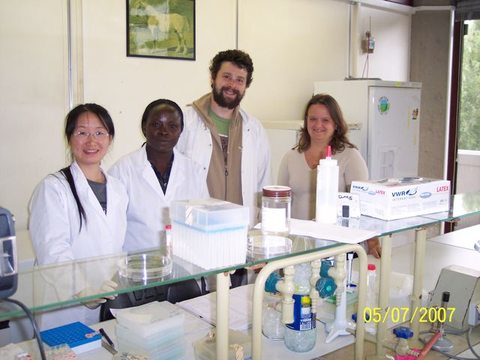 IPULET Perpetua, Uganda
IPULET Perpetua, Uganda
Abstract 1 (copied from original project proposal)
Capacitiy building is requested are of two levels: Individual training in Belgium and group trainingin Uganda
1. Individual training at the Mycotheque of the catholic University of Louvain (BCCM/MUCL) needed in:
- fungal herbaria and culture collection management: theoretical and practical courses on herbaria and culture collection organization, methods for long-term preservation of living strains, technologies easily transferable at low cost for Uganda.;
- material Transfer Agreement related to living fungal resource (pure culture); exchange agreement between the Makerere University and MUCL for safe deposit of the Uganda collection at MUCL and for sending of reference material to Uganda;
- modern methods for taxonomy: theoretical and applied trainings in DNA-based taxonomy. This training will be applied to some species complexes in Africa (Fomitiporia punctata and Perenniporia medulla-panis complexes).


Training in Belgium
2. Group training in Uganda by the Belgian supervisor
Dr. Cony Decock will later run a course on wood-inhabiting fungi taxonomy, isolation, purification of strains, in laboratory conditions then demonstration of collecting, preparing herbarium samples, isolating, and purifying strains in the field conditions for group of student at Botany Dept., Makerere University.
Dr Decock's conclusion, as taken from his comprehensive GTI report, is pasted below:
"The training was well organized by the Dr. Perpetua Ipulet, who managed to have good stereomicroscopes and microscopes in a classroom, transportation to Mpganga forest, and to the other places, and very good managing for the Congolese team that was met on time at Mutsora.
In general the training went very well. Students, both Ugandese and Congolese, were very motivated, although some have not necessarily a strong background in mycology. Teaching of mycology remains still poor in Uganda and the situation is worst in RDC.
Collections were very good, especially in Kibale National Park and Mount Rwenzori. In total, about 100 collections were made during the training, and about 50 were obtained in our culture. Several collections of polypores representing undescribed species and genus (probably) have been re-collected and cultured.
In depth studies of these collections, including phylogenetic relationships, are done jointly with the Dr. Ipulet."
C. Decock, 18 March 2008




Left: bench work at Makarere University; middle: Phyllophoria (Boletales) as found in Kibale National Park; right: Discussion with thelocal
population about edible fungi at Mutsora
Abstract 2 (as taken from original project proposal)
This is a follow up of the 2007 project, on pore fungi collected by the applicant during her PhD research in Uganda. The thesis was examined by Dr Cony Decock, Mycotheque de l'Universite de Louvain (MUCL).Dr Decock questioned the determination of some of the species and the applicant's visit to MUCL was useful in confirming this.
At least 11 species had been wrongly identified and at that time DNA analysis failed and collection of fresh material was recommended. Dr Decock visited Uganda and the Democratic Republic of Congo, and fresh material was collected, including some of the 11 species above.
DNA analysis should is to be completed still to confirm the status of collections, and to complete microscopic analysis of the collection to fully describe some taxa, both species and genera new to science.


Follow-up training in Belgium. Left: Dr Decock flanked by Ms M. Cabarroi and Dr P. Ipulet; right: Fr Ipulet
Read Dr Ipulet's GTI reports to find out more about how her scientific visit to Belgium has advanced her as a practising taxonomist.Read also her account in the journal MycoAfrica.
Browse through Dr Ipulet's GTI presentation to learn more about her project.

